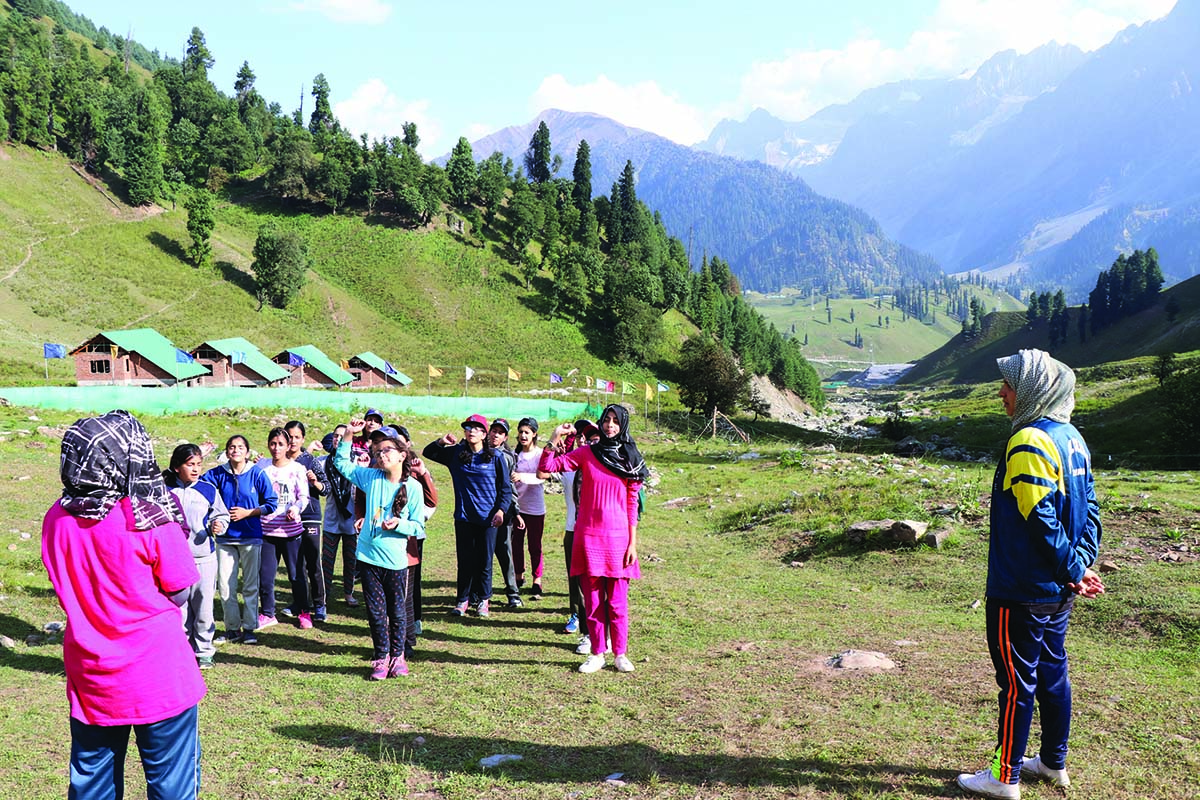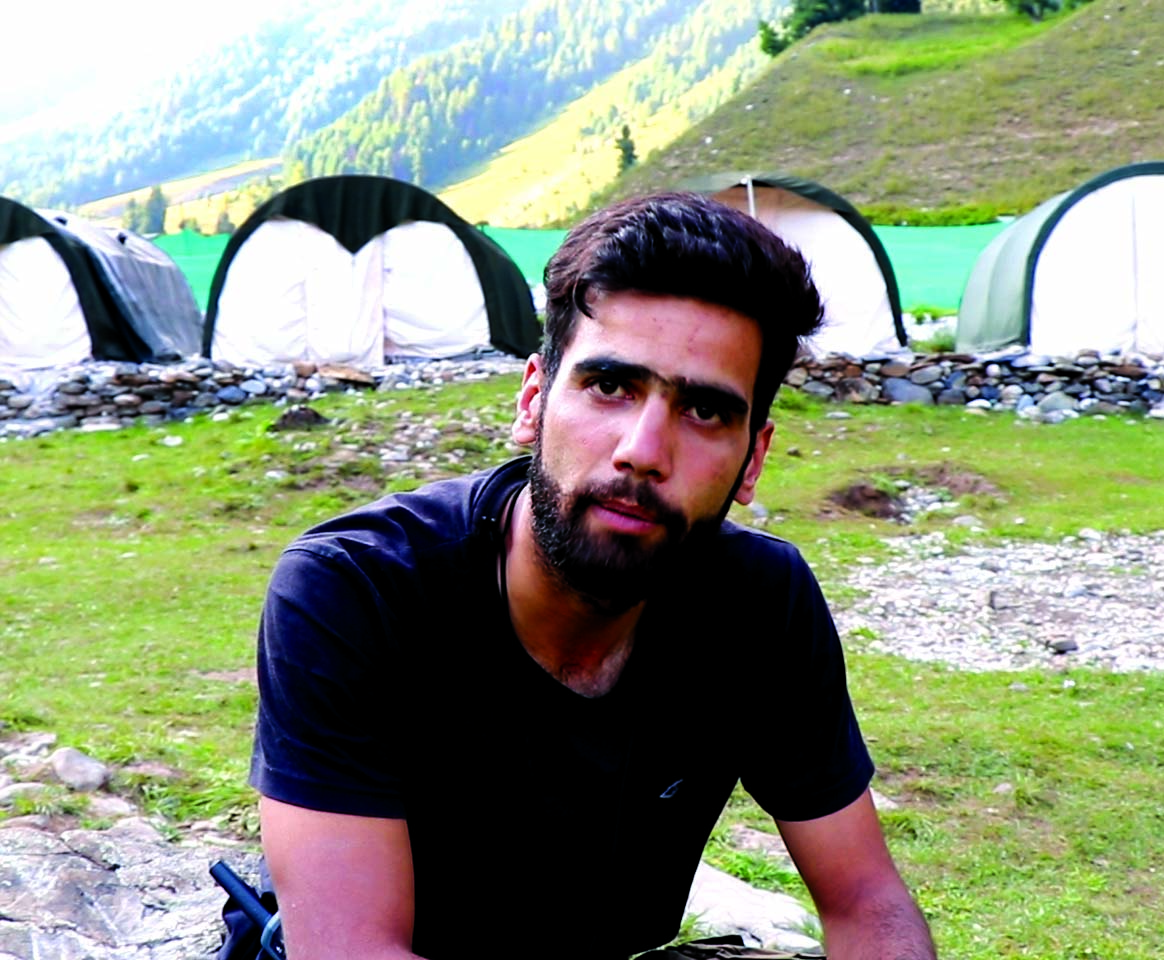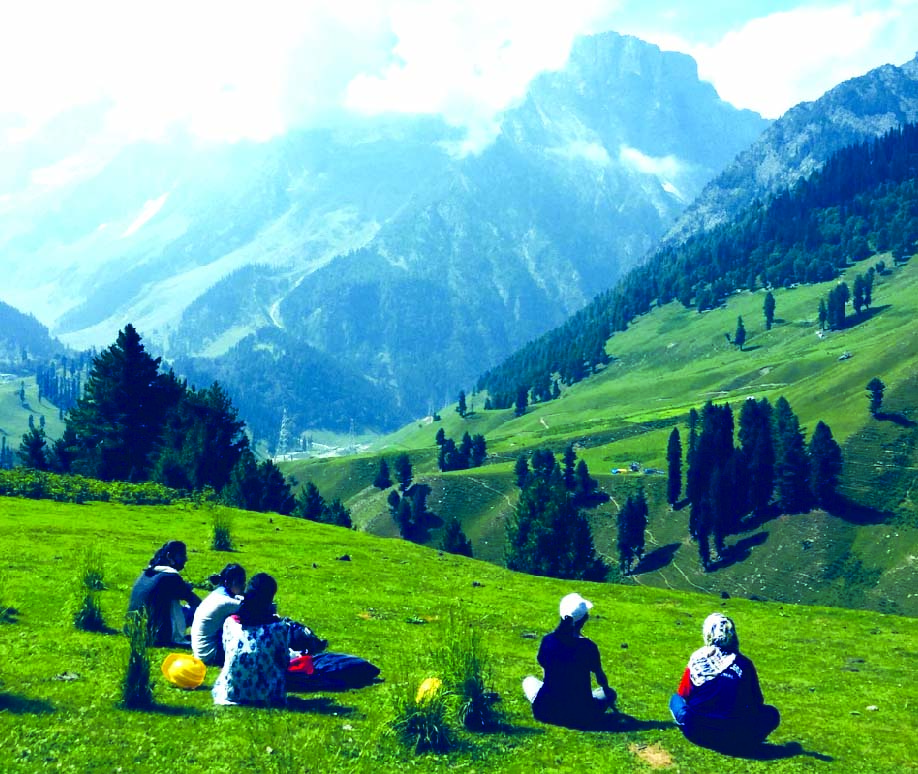Camping and trekking have remained associated with the high-end schools and colleges in Kashmir. Shams Irfan reports the emergence of a new enterprise that hosts groups of boys and girls from modest schools and guides them to trekking and hiking amid fun and frolic

If you are not an athlete you might need to take a break at the make-shift bridge Abdul Basit Shah, 21, and his friends have made over a gushing brook in Lashpathri, Sonmarg, around 100 kilometres from Srinagar. This suspension bridge, made with wooden planks and ropes, is the only way to access base-camp of Team Mountaineers, an initiative Basit has launched in May 2017.
The camp-site is dotted with rows of tarpaulin tents, which Basit himself designed. Once inside the large compound, spread over 10.5 kanals of lush green meadow, owned by his family, a sense of relief overtakes you. In a corner, young school girls, wearing colourful track-suits, ready themselves under the afternoon sun for a day’s trekking.
Basit’s first whistle alerts girls and gets them to form a line. On the second whistle, they slowly begin walking towards a nearby hillock, with their hiking sticks in hand. They are led by a female instructor. These girls are from a co-education school in Pulwama. “They will stay here four days as part of their trekking cum camping package,” says Basit, watching them with binoculars as they slowly get out of his sight. “At the end of four days, they will go home as completely changed lot.”
The idea
A resident of Chrar-e-Sharief, when Basit was in Class IX, he recalls watching buses pass by his hometown carrying students of elite Srinagar schools on expeditions. “I used to get fascinated by just watching them pass,” recalls Basit.
It was then the idea to start a camping expedition for modest schools like his came to Basit. “I recall clearly, it was 2009 when I decided to start my own expedition company,” said Basit. “I was keen to start it once I finish my school.”
However, the idea had to wait till Basit finished his Bachelors in Business Administration (BBA) from the Islamic University of Science and Technology (IUST) in August 2017.
But for Basit, whose family is into selling medicines since 1947, breaking family tradition to start something out-of-the-box was not easy. “I had to face lots of challenges to convince my family,” said Basit. “But after a while they understood.”
Once the convincing part was over, the real challenge for Basit begun. “I wanted to get registered with the government so that I get land on lease for erecting camps,” said Basit.
In early 2017, while he was still pursuing BBA, Basit started chasing around government offices to get the required paperwork done. “But after moving around for months, I was nowhere,” recalls Basit.
Then, Baist requested his father and uncle, who jointly owned 10.5 kanals of land in Lashpathri, Sonmarg, to allow him to use it for his venture. “They were happy to help me,” said Basit.
Basit’s father helped him with initial investment money of Rs 40 lakh for this. “I went to Delhi to get everything I needed to start the venture,” said Basit. “Only thing I lacked was permission from the government.”
After college, Basit spent his idle time in designing tents for his site. “It took me two months to get the necessary permission from tourism department,” said Basit.
The day Basit got permission from the Tourism Department he straightaway drove to Sonmarg with camping material and started working on the base-camp.
Once the work on base-camp was done, Basit started convincing schools to send their kids for expeditions. “I started from my own school in Chrar-e-Sharief,” recalls Basit.
First camp
It took Basit almost no effort to convince principal of his alma mater, Life School, Chrar-e-Sharief, to send the first batch of students for a four-day camping expedition. “We have been discussing this idea for a long time. So it was easy to convince him,” recalls Basit.
Also, being a local helped Basit as most of the parents knew him personally. As Basit met the parents of Life School students, he realized it was easy to convince them to allow their kids for such an expedition. “What I couldn’t do in my school time, I wanted these kids to experience,” said Basit.
Finally, on a summer morning, 27 girls from Life School arrived for a four-day expedition at Lashpathri, Sonmarg. “I was both excited and nervous,” recalls Basit.

In the next four days, Basit and his team: two female coordinators, two male instructors, three cooks and a driver realized that handling students was not an easy job they had thought. “The first group helped us get firsthand experience of handling students,” said Basit. “Till now, I was just doing it on paper. But working with them taught us a lot.”
After the first group of girls left, Basit’s team welcomed forty-five boys from the same school. “We host girls and boys separately from a single school,” said Basit.
It took lots of efforts from Basit and his friends to create an ideal itinerary for students included exercise on local tracks to get them familiar with their surroundings. “This is for the first day’s stay at the camp,” said Basit.
On the second day, students are taught how to survive in a jungle and how to trek through forests. They are also taught how to build a shelter in a forest using material available in the woods. “We divide them in a small group and teach them how they must assist each other in everything from cooking to gathering items of requirement,” said Basit. “This helps them work as a family.”
On the third-day, students reverse trek 17 kilometres to Thajiwas glacier in Sonmarg. In the evening, students are encouraged to tell stories, make a campfire, dance, do mimicry and sing. “This helps boost their confidence and make them bold,” said Basit. “When they leave on the fourth day, they go as changed persons with lots of experience. But they have to follow a strict routine, and experience life in the wild.”
Since the inception, Basit’s team has handled seven local schools and seven independent groups from areas other than Srinagar city.
But the most challenging task so far was to conceive and handle an all-girl expedition. “It was a crazy idea given the place we live in, but we still did it,” said Basit with a hint of pride in his voice.
Girl’s Day Out
In late June 2017, Basit started advertising on social media about an upcoming all-girl expedition. Within no time Basit’s mailbox was flooded with request for participation from the valley across. “I got over 400 calls within a few days,” recalls Basit. “I was really excited.”
However, Basit excitement proved short-lived as there was a catch; he was requested to convince their parents. “Almost every single girl wanted me to convince her parents,” said Basit.
As the idea of an all-girl expedition was close to Basit’s heart, he started making calls to convince their parents, but without any luck. “In the end, only five girls could come,” said Basit.
On August 4, 2017, Basit’s team received these girls at the front gate of his camp in Sonmarg. “It was an emotional movement for them as no one has ever been on a solo trip before,” said Basit.
Interestingly, three out of five girls were from Kupwara, including a doctor, who wanted to take a break from her hectic lifestyle before she would change her profession.

The other girl, also from Kupwara, had an interesting story to back her presence in the hills. She had suffered heart-attack twice, and for that reason was denied a chance to go with her classmates on any trip during her school days.
For Hina Mushtaq, 22, a student of Bachelors in Commerce, who was part of the group, four days spent on her own, helped her become confident in her life. “I had to convince my mom first, who, in turn, talked to my father,” said Hina. “It took lots of efforts but it was worthwhile.”
Hina, who had her sister along on the expedition, had never been away from her home for a single night without her parents. “It was a lifetime experience. I was free. I could have never imagined myself doing this but I am thankful I went on the trip,” said Hina with excitement visible in her voice.
Like other girls, Hina too had never trekked before. “The first day I thought I cannot walk at all,” recalls Hina. “But now I can walk for miles and I am full of confidence.”
Back at the campsite, as the sun slowly hides behind a huge mountain, girls from the Pulwama School walk back from day’s trek. Watching them with concerned eyes from a distance Basit smiles and said: “It is not my business alone, but a hobby as well.”















